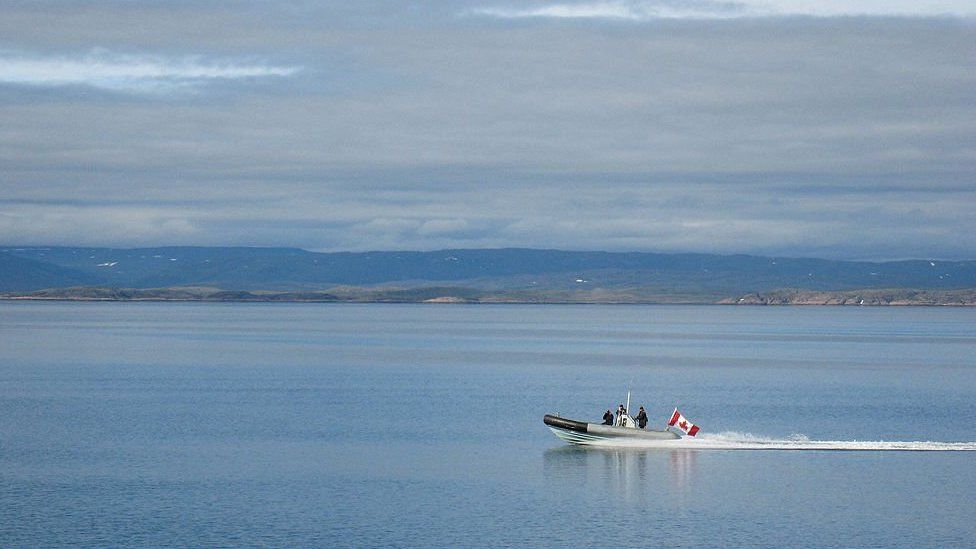ARTICLE AD BOX
 Image source, Getty Images
Image source, Getty Images
Canada's defence ministry said the military has stopped several surveillance attempts on Canadian territory since 2022
By Nadine Yousif
BBC News, Toronto
Canada's military has said it recently discovered evidence of Chinese surveillance efforts in the Arctic.
The discovery, first reported by Canadian newspaper The Globe and Mail, has raised questions about China's activities in the far north.
It comes after a suspected Chinese spy balloon floated through US and Canadian airspace before it was shot down by the US military.
China has also been recently accused of interfering with Canadian elections.
Monitoring buoys were discovered and retrieved last fall as part of Operation Limpid, an ongoing mission by the Canadian military tasked with identifying threats to the country's security by surveilling air, land and sea domains.
A spokesperson for Canada's Department of National Defence, Daniel Le Bouthillier, said in a statement that the military "is fully aware of recent efforts by China to conduct surveillance operations in Canadian airspace and maritime approaches".
Mr Le Bouthillier added that China does this using "dual-purpose technologies", meaning devices that conduct surveillance both for research and military purposes.
He said the military has stopped attempts to surveil Canadian territory since 2022, but did not elaborate on their nature.
China has long displayed interest in the Arctic. It has sent high-level figures to the region 33 times in the last two decades, and participates in most major Arctic institutions.
It has also expanded its icebreaker fleet and sent naval vessels to the north, often for research expeditions.
Image source, Getty Images
Image caption,China has long displayed interest in the Arctic. In 2021, it sent an icebreaker on a five-month research expedition across the region
China hopes to unlock a shorter trade route to Europe through the region as ice sheets melt due to climate change, and gain access to emerging resources.
But experts say that China's research interests in the region have also doubled as attempts to surveil military assets in the Arctic.
Their efforts are tied to a larger drive by several Arctic nations - namely the US, Canada, Finland, Russia, Norway and Sweden - to unlock untapped potential in the region.
"This is a part of the world that has not been mapped and understood to the same degree of detail as other latitudes," said Roberto Mazzolin, a senior fellow at the Centre for International Governance Innovation and a former high-ranking official in the Canadian Armed Forces.
Mr Mazzolin said Canada has historically looked at the Arctic as a safe area with little potential for threat. But interest in the region by Russia, and more recently China, has changed that.
"[Canada is forced to] look at how we would posture our own security, our military defence, or our economic development activities to secure Canadian and American interests," he said.
On Wednesday, Canadian foreign minister Melanie Joly told CNN that she views China as an increasingly disruptive power.
Ms Joly added that Canada is working closely with the US to protect North American airspace, as well as Canada's Arctic sovereignty.
The Canadian military's discovery of the Chinese buoys comes at the heels of revelations by Canadian intelligence that China had tried to interfere in Canada's last federal election in 2021.
In documents first reported on by the Globe and Mail, the Canadian Security Intelligence Service outlined China's efforts to re-elect Justin Trudeau's Liberals to a minority of government, and to ensure the defeat of Conservative politicians who are seen as unfriendly to China.
It did so through cash donations to preferred candidates, the spread of disinformation and using consulates and paid students to help certain Liberal candidates, according to reporting by the Globe.
Canadian parliamentarians are in the midst of probing allegations that China interfered in Canada's 2019 federal election. On Tuesday, they expanded their scope to include the 2021 election as well.
On Wednesday, Prime Minister Trudeau called the suspected Chinese election interference "an extraordinarily serious issue", and said he supported a further probe into these reports.
He added the meddling efforts so far appear to have been unsuccessful, but still raise concern that foreign countries are trying to interfere with Canada's democratic processes.
"Foreign actors are trying to undermine people's confidence in democracy itself," Mr Trudeau said.
Chinese officials in Canada have denied these reports, saying they do not interfere in Canadian election or internal affairs
Earlier this month, China's suspected surveillance efforts in North America dominated headlines after a Chinese balloon was discovered flying over North America.
Both the US and Canada said that the balloon was spying on sensitive military assets. China, however, has denied it was used for surveillance, instead saying it was a civilian weather balloon that had blown off course.

 2 years ago
49
2 years ago
49








 English (US) ·
English (US) ·